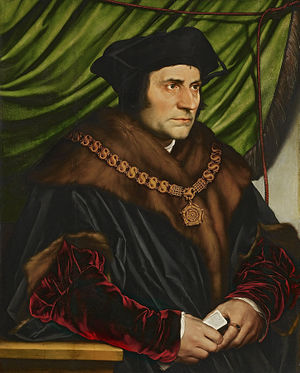Tómas More
Sir Thomas More (1478–1535), saint, statesman, scholar, and author, was an incarnation of El Morya, who had been Thomas Becket in a previous life. He served as Lord Chancellor of England under King Henry VIII, the reembodied Henry II. Once again they were given the choice to serve God’s will or man’s will.

More discharged his duties wisely and well, but was beheaded because he failed to support the king in his departure from the laws of the Church regarding his marriage to Ann Boleyn.
Early life
Herra Tómas More, virtur í nútímanum fyrir fjölhæfni sína, fæddist árið 1478 í hjarta Lundúna. Faðir hans, mikilhæfur lögfræðingur og dómari, sá til þess að hann fékk framúrskarandi menntun. Átján ára yfirgaf hann háskólabæinn Oxford með yfirgripsmikla þekkingu á klassíkinni og helgaði sig lögfræðinámi.
Tómas var þegar á unga aldri náinn vinur hins virta hollenska hugvísindamanns (húmanista) Erasmusar og naut vaxandi hylli Hinriks konungs VIII sem réð hann til að sinna erindagjörðum erlendis. Tómas gat sér einnig góðan orðstírs fyrir bókmenntaástundun sína. Hann var fyrstur þarlendra höfunda sem var lofaður fyrir enskan prósa, óbundið mál, fyrir verk sitt Ævi Ríkharðs III (Life of Richard III), nákvæmt sagnfræðirit sem Shakespeare fylgdi eftir með því að fylla upp í smáatriðin.
Djúp hollusta More við Guð olli því að hann hugleiddi á tímabili að gefa sig að trúmálum sem kom fram í óvenjulegum meinlætalifnaði í rúm fjögur ár til að temja sér meiri sjálfsaga. Hann ákvað hins vegar að giftast og kona hans og fjögur börn reyndust vera honum hinn mesti gleðigjafi og einasta huggun hans á erfiðleikatímum. Hið ágæta bú fjölskyldunnar í borgarhlutanum Chelsea í Lundúnum hýsti alla fjölskyldu Tómasar þar á meðal ellefu barnabörn. Í gegnum árin varð „litla sæluríkis-útópían“ hans, eins og hann kallaði þetta framtak sitt oft, menningarog fræðasetur sem Erasmus líkti við „akademíu Platóns“. Hinir lærðustu menn samtímans heimsóttu hið velviljaða heimili hans, jafnvel konungurinn sjálfur, til ráðagerða og uppörvunar. Í Chelsea skrifað More hið fræga verk sitt Fyrirmyndaríkið Útópía sem var hnyttin útlistun á yfirborðslegu líferni Englendinga og ófullkomleika enskra laga.
Árið 1529 skipaði Hinrik VIII Tómas lávarð og kanslara Englands. Um hann skrifaði Erasmus: „Enginn maður gefur betri ráð um alvarleg málefni en ef konungur óskar að létta sér lund, fær hann hvergi annars staðar jafn fjörlegar samræður. Oft eru mál margflókin og rista djúpt sem þarfnast málefnalegra og skynsamlegra úrlausna. More leysir þau þannig að komið er til móts við báða málsaðila.”
In spite of many honors and achievements, More sought no man’s esteem. He remained sensitive to the needs of the common people by daily walking the back streets of London to inquire into the lives of the poor. And even as Lord Chancellor, it was his daily custom to enter the court of judges at Westminster Hall where his father sat, to kneel, and to ask his blessing.
Conflict with the king
Sir Thomas devoted himself to his duties with utmost zeal until Henry, desirous of but lacking a male heir to the throne, declared his marriage to Catherine of Aragon null and announced his intent to marry Ann Boleyn. Since the divorce was without Papal approval and directly opposed to the laws of the Church, More refused to support the king’s decision. He resigned his office and retired to Chelsea where, greatly concerned with the heresies of Luther’s revolt, he continued his writings in defense of the Catholic faith.
Without friends and without office, More and his family lived in abject poverty. Nevertheless, Henry had been insulted at the chancellor’s public disapproval of him. The king, therefore, sought to defame More and thus restore his royal image. When Sir Thomas clearly refused to give the oath of supremacy to Henry as head of the new Church of England, he was imprisoned in the dread Tower of London. Badgered by king’s lawyers, More staunchly refused to compromise the position of the Church but diplomatically avoided direct accusation of the king, thereby saving his life and remaining a testimony to Henry’s sinful injustice.
Finally, however, jealous enemies were encouraged by Henry to lie against him in the chancellor’s own court at Westminster. Charged and convicted of high treason, Thomas More was beheaded on Tower Hill in 1535. Kneeling before the executioner, he said, “I die the king’s loyal subject but God's first.”
Legacy
Sir Thomas More was beatified by the Roman Catholic Church in 1886 and canonized in 1935.
More’s most famous work, Utopia, is an attempt to depict an ideal society, one in which men live in harmony under the holy will of the Most High God.
The motion picture based on the play by Robert Bolt, A Man For All Seasons, is the story of the life of Sir Thomas More.
An ironic footnote to this episode is that in 1538 Henry VIII had the shrine of Saint Thomas Becket broken to pieces. After so many centuries he had never forgiven Becket. Henry ordered Becket’s name erased from the prayer books and prohibited any images of Becket in England.
Sources
El Morya, The Chela and the Path: Keys to Soul Mastery in the Aquarian Age.
Elizabeth Clare Prophet, February 17, 1990.
